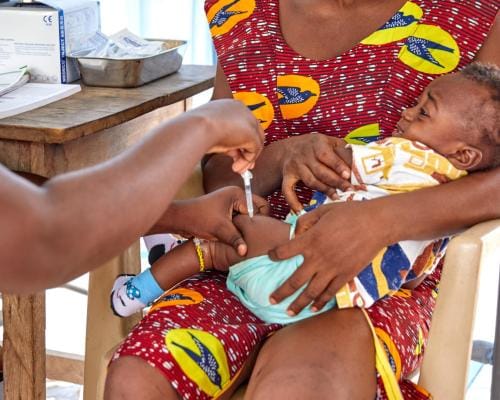Enhancing capacity for malaria vaccine introduction and rollout in Africa through experience sharing | WHO | Regional Office for Africa

Source: WHO | Regional Office for Africa
Accra, Ghana - Since 2019, Ghana, Kenya and Malawi have been rolling out malaria vaccines, with over 2.5 million children already receiving at least one dose of the life-saving vaccine that is protecting children from deadly malaria.
In 2024, more than 20 countries in Africa are to introduce the vaccine into routine immunization, with Cameroon, Burkina Faso, Benin, Liberia and Sierra Leone already leading the way. The scale-up of malaria vaccines in Africa will increase access to malaria prevention and save tens of thousands of young lives every year.
As part of efforts to support the wider introduction and rollout of the malaria vaccine, the World Health Organization (WHO), PATH and other partners convened stakeholders from Nigeria, Guinea, Cote d'Ivoire and Liberia to learn from Ghana's malaria vaccination experience on 16-18 April in Accra, Ghana, and ensure adequate preparation towards new introductions and rollout across these countries.
Drawn from ministries of health, WHO and UNICEF, participants also benefitted from the experience of other countries that have already introduced the vaccines such as Burkina Faso, Cameroon and Sierra Leone.
"Having been delivering malaria vaccine to children across seven regions, Ghana's experience and lessons will be key to the introduction and rollout of the vaccine in countries that are yet to introduce," says Dr Frank Lule, the Officer-In-Charge of WHO Ghana.
Participants gained insights into vaccine introduction, risk communication, readiness monitoring, supervision, and data management among others. Additionally, a field visit to malaria vaccination centers was organized to provide participants with firsthand experience in Ghana's vaccination process.
"In workshops like this, when we exchange information, the result and the impact tend to be greater efficiency with the resources that we have to reach children and to vaccinate," says Evan Simpson, Director of Vaccine Implementation, PATH.
As Africa continues to shoulder 94% of the global malaria burden, the WHO and its partners are strengthening malaria control efforts with vaccines being the latest in the control toolbox. In January 2024, the WHO Regional Office for Africa established the Accelerating Malaria Vaccine Introduction and Rollout in Africa (AMVIRA). This initiative aims to strengthen the provision of state-of-the-art technical support to Member States in their efforts to introduce and roll out malaria vaccines while strengthening partners' coordination at national, regional, and global levels effectively and efficiently.
WHO and partners also leveraged the workshop to address information gaps and share lessons and best practices to ensure successful vaccine introduction and rollout in countries that are yet to do so.
For participants, the knowledge gained from the country peer learning workshop will help shape their strategies towards effective malaria vaccine rollout.
"One of the key lessons I have picked up from Ghana's experiences is the role of effective coordination and collaboration. Though we have a coordination team, we are going to strengthen this team through the addition of more stakeholders, including communities and civil society organizations," says Dr Yao Kossia Deputy Manager, the Expanded Vaccination Programme, Côte d'Ivoire.
Highlighting the significance of the knowledge gained, Dr Garba Ahmed-Rufai, the Director for Disease Control and Immunization of Nigeria noted "What we have learned is programming in terms of the rollout, and the timing of the doses, and the lessons learnt. And knowing what the problems are from the other countries, we would just adjust accordingly, so that we can overcome all of that".
In addition to facilitating cross-learning, WHO through the AMVIRA initiative is enhancing the capacity of countries to ensure effective introductions and rollout. There has been the deployment of experts in Immunization, data management, risk communication, and external communication to assist 5 countries in efficiently planning and delivering vaccines.
A similar workshop has been held in Cameroon, with more countries expected to participate in other workshops in Benin and Malawi.



